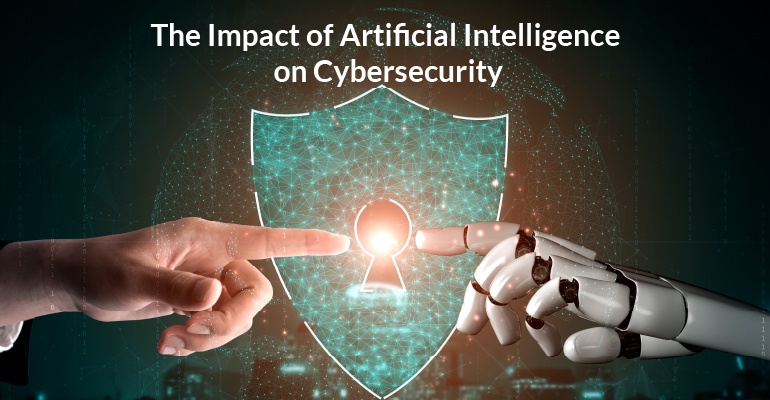Today, each and every company on the planet is fighting against continuous cyber-attacks. We get shocked whenever we come across the news on breaches because the cybercrime marketplace is growing and cyber threats begin to beat human capability.
To overcome the cyber threats, the adoption of artificial intelligence to ensure cybersecurity has accelerated throughout diverse sectors. The reason behind this is that various civil organizations, governments, and industries all recognize higher efficiency and lesser costs available from the utilization of AI-generated automation.
Do you want to know how artificial intelligence is impacting the cybersecurity world?
In this blog, we’ll explore a lot about the impact of artificial intelligence in cyber security following the benefits of AI in cybersecurity and various applications.
Keep Reading!
Role of Artificial Intelligence in Cybersecurity
The potential of cyberattacks in modern business environments is continuing to rise at a fast pace. This means that there is a huge need for analyzing and refining an organization’s cybersecurity posture than simply depending on human intervention.
Today, artificial intelligence and machine are becoming more important to information security. Because present technologies are highly capable of quickly analyzing massive data sets and monitoring ample cyber threats – from phishing attacks to malware menaces.
Find here some statistics to understand the significance of AI for cybersecurity:
- According to 61% of enterprises, detecting breach attempts today is impossible without the utilization of AI technologies.
- 51% of executives are rigorously using AI for outpacing prediction and cyber threat detection.
- As per the report by MarketsandMarkets, the global AI in cybersecurity market is going to reach $38.2 billion by 2026, evolving at a CAGR of 23.3% during the period from 2021 to 2026.
Overall, these statistics recommend that AI is playing a crucial role in cybersecurity. This technology can hugely transform cyber workflows into well-streamlined processes that accelerate remediation and increase protection.
Benefits of Using AI in Cybersecurity
Be it Google, Microsoft, IBM, or any other emerging cybersecurity vendors, all of them are investing in artificial intelligence to overcome growing complex threats with the help of AI professionals.
Implementation of AI in cybersecurity comes with enormous benefits for the business pioneers and government for securing organizations, systems, people, and communication from persistent cyber adversaries. AI’s operations across the cyber workflow involve tracking down massive data to spot nuanced adversarial attacks, measuring the risks related to recognized vulnerabilities, and improving decision-making with data at the time of threat hunts.
The long-term advantages of integrating AI into a company’s cybersecurity ecosystem are such as:
- Saves time as AI accelerates the recognition and response cycle time, quickly measures risks and improves analyst decision-making.
- Enhances protection because of AI’s ability to spot nuanced attacks, enhance security, and increase incident response
- Ensure better workforce satisfaction so that cybersecurity experts could focus on high-level tasks instead of inefficient manual actions
- Strengthens safety of brand reputation and trust in protocols as well as security systems of an organization
If you’re someone pursuing top ai certification program, you may receive in-depth knowledge of the implementation of AI in cybersecurity.
Applications of AI in Cybersecurity
Here is the list of applications that show the existing use of AI in cybersecurity:
- Malware Analysis: AI can help figure out how malware works. Malware detection tools that utilize AI allow people to respond quickly and secure themselves better in future attacks.
- Threat Detection: AI is used to discover possible attacks on systems and other threats. Machine learning algorithms can help monitor massive data, and figure out patterns that indicate a cyberattack is happening
- User Authentication: AI can improve user authentication processes by understanding user behavior, discovering anomalies, and spotting potential attacks.
- Password Management: Artificial intelligence in cyber security has the ability to protect passwords by identifying password patterns and discovering weak passwords that are guessable and easy to hack.
Challenges of Integrating AI in Cybersecurity
While the advantages of AI in Cybersecurity are noteworthy, the challenges associated with its implementation come with it.
The first challenge is the possibility of bias in artificial intelligence algorithms. These biases come from the data utilized to train the algorithms, which either may be biased toward any group or incomplete. Due to this, AI algorithms become powerless in finding out cyber threats.
The second challenge is the requirement for human oversight. Although AI can help a lot in threat detection, however, it is unable to take the place of human intelligence. There is still a need for humans to understand the data and make valid decisions to overcome potential cyber threats.
Last but not the least, another major challenge is to ensure that AI systems are fully secure. Because AI has now get integrated into cybersecurity systems, the possibility of cybercriminals using the vulnerabilities in such systems has also been boosted. Hence, its crucial for AI consultant to ensure that AI systems are developed with security in mind.
Future of AI in Cybersecurity
The future of AI in cybersecurity is bright, with a big room for exponential growth and innovative ideas. There are many other technologies where AI could be integrated such as like Internet of Things (IoT) and blockchain.
It is best to use AI in cybersecurity to ensure protection against cyber threats. Artificial intelligence can detect and fight threats rapidly and accurately by analyzing greater amounts of data.
As artificial intelligence is becoming extremely crucial in cybersecurity, there will be a need for people who know how AI works in the cybersecurity world. Professionals who pursue artificial intelligence certification will get an in-depth understanding of both AI and cybersecurity technologies.


No comments yet